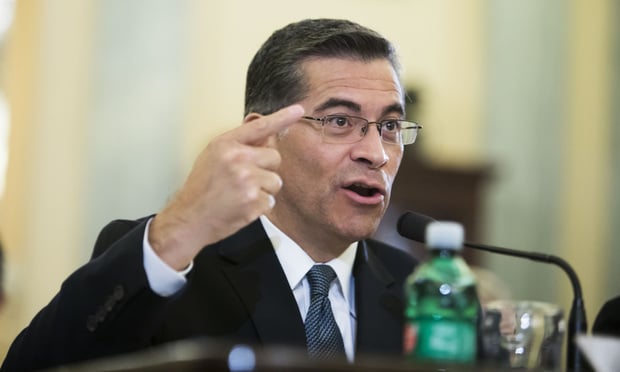Becerra Wants Help From Judges to Resist Immigration Crackdown
The California attorney general's office was required to publish policies “limiting assistance with immigration enforcement to the fullest extent possible."
October 01, 2018 at 08:07 PM
3 minute read
 California Attorney General Xavier Becerra testifies in Washington in September. Credit: Diego M. Radzinschi/ ALM
California Attorney General Xavier Becerra testifies in Washington in September. Credit: Diego M. Radzinschi/ ALM
California court leaders must adopt new policies to limit employees' cooperation with federal immigration enforcement actions in their courthouses, under guidance issued Friday night by Attorney General Xavier Becerra's office.
The directive, issued in response to so-called sanctuary state legislation enacted last year and largely upheld this summer by a federal judge in Sacramento, lays out four sets of model policies that court officials “shall adopt” to shield undocumented immigrants who come to court.
The legislation required the attorney general's office to publish policies “limiting assistance with immigration enforcement to the fullest extent possible.” Courts must enact policies “permitting wide access to justice,” including “the use of pseudonyms, where feasible, appropriate to protect an individual's safety, and permitted by applicable state law.”
Arrests of undocumented immigrants will be barred within juvenile courthouses and courtrooms “unless there is an immediate risk to the safety and protection of the public.”
Court workers in most cases may not assist in immigration enforcement activities, and they must be trained that U.S. Department of Homeland Security “administrative subpoenas and federal court subpoenas do not require immediate compliance despite the warning language that may be included on the form.”
Court employees may not share anyone's immigration status or release date unless the immigration officer has a valid judicial warrant, subpoena or court order.
The requirements for courts were released by the attorney general's office at the same time as three other policy manuals for medical facilities, colleges and universities, and shelters serving emergency evacuees, the homeless and those fleeing domestic violence.
Attorneys with the California Department of Justice consulted with Alex Calvo, executive officer of the Santa Cruz County Superior Court, and Sonoma County Superior Court Presiding Judge Gary Nadler while preparing the report.
“Fortunately, a lot of what is in this report are things that courts may not have documented but they already do,” Calvo said.
California courthouses, for instance, already have restricted areas where only certain employees are allowed. “We're not going to let someone in those areas just because they flash a badge,” Calvo said.
State courts also currently allow some parties to a case, including juveniles and those alleging abuse, to use pseudonyms.
The attorney general's office did not set a deadline for courts to adopt the new policies, and many judges and court executive officers were still learning about the report's contents on Monday, Calvo said.
A spokeswoman for the U.S. Immigration and Customs Enforcement Agency did not return a message left Monday seeking comment on the new policy directive.
Chief Justice Tani Cantil-Sakauye has criticized federal immigration officials for detaining and arresting undocumented immigrants in state courthouses, arguing that such actions deter victims and witnesses from appearing for cases. Immigration agency leaders say courts with security screening provide a safer environment for detentions than neighborhood actions.
Gov. Jerry Brown last week vetoed legislation aimed at barring civil arrests in state courthouses. Brown said he wanted the attorney general to finish his work on immigration enforcement cooperation policies, which were ultimately released Friday.
This content has been archived. It is available through our partners, LexisNexis® and Bloomberg Law.
To view this content, please continue to their sites.
Not a Lexis Subscriber?
Subscribe Now
Not a Bloomberg Law Subscriber?
Subscribe Now
NOT FOR REPRINT
© 2025 ALM Global, LLC, All Rights Reserved. Request academic re-use from www.copyright.com. All other uses, submit a request to [email protected]. For more information visit Asset & Logo Licensing.
You Might Like
View All
Buchalter Hires Longtime Sheppard Mullin Real Estate Partner as Practice Chair

Reality TV Couple and Pacific Palisades Neighbors Sue City of Los Angeles Over Loss of Homes to Fire
3 minute read
In Resolved Lawsuit, Jim Walden Alleged 'Retaliatory' Silencing by X of His Personal Social Media Account
Trending Stories
- 1No Two Wildfires Alike: Lawyers Take Different Legal Strategies in California
- 2Poop-Themed Dog Toy OK as Parody, but Still Tarnished Jack Daniel’s Brand, Court Says
- 3Meet the New President of NY's Association of Trial Court Jurists
- 4Lawyers' Phones Are Ringing: What Should Employers Do If ICE Raids Their Business?
- 5Freshfields Hires Ex-SEC Corporate Finance Director in Silicon Valley
Who Got The Work
J. Brugh Lower of Gibbons has entered an appearance for industrial equipment supplier Devco Corporation in a pending trademark infringement lawsuit. The suit, accusing the defendant of selling knock-off Graco products, was filed Dec. 18 in New Jersey District Court by Rivkin Radler on behalf of Graco Inc. and Graco Minnesota. The case, assigned to U.S. District Judge Zahid N. Quraishi, is 3:24-cv-11294, Graco Inc. et al v. Devco Corporation.
Who Got The Work
Rebecca Maller-Stein and Kent A. Yalowitz of Arnold & Porter Kaye Scholer have entered their appearances for Hanaco Venture Capital and its executives, Lior Prosor and David Frankel, in a pending securities lawsuit. The action, filed on Dec. 24 in New York Southern District Court by Zell, Aron & Co. on behalf of Goldeneye Advisors, accuses the defendants of negligently and fraudulently managing the plaintiff's $1 million investment. The case, assigned to U.S. District Judge Vernon S. Broderick, is 1:24-cv-09918, Goldeneye Advisors, LLC v. Hanaco Venture Capital, Ltd. et al.
Who Got The Work
Attorneys from A&O Shearman has stepped in as defense counsel for Toronto-Dominion Bank and other defendants in a pending securities class action. The suit, filed Dec. 11 in New York Southern District Court by Bleichmar Fonti & Auld, accuses the defendants of concealing the bank's 'pervasive' deficiencies in regards to its compliance with the Bank Secrecy Act and the quality of its anti-money laundering controls. The case, assigned to U.S. District Judge Arun Subramanian, is 1:24-cv-09445, Gonzalez v. The Toronto-Dominion Bank et al.
Who Got The Work
Crown Castle International, a Pennsylvania company providing shared communications infrastructure, has turned to Luke D. Wolf of Gordon Rees Scully Mansukhani to fend off a pending breach-of-contract lawsuit. The court action, filed Nov. 25 in Michigan Eastern District Court by Hooper Hathaway PC on behalf of The Town Residences LLC, accuses Crown Castle of failing to transfer approximately $30,000 in utility payments from T-Mobile in breach of a roof-top lease and assignment agreement. The case, assigned to U.S. District Judge Susan K. Declercq, is 2:24-cv-13131, The Town Residences LLC v. T-Mobile US, Inc. et al.
Who Got The Work
Wilfred P. Coronato and Daniel M. Schwartz of McCarter & English have stepped in as defense counsel to Electrolux Home Products Inc. in a pending product liability lawsuit. The court action, filed Nov. 26 in New York Eastern District Court by Poulos Lopiccolo PC and Nagel Rice LLP on behalf of David Stern, alleges that the defendant's refrigerators’ drawers and shelving repeatedly break and fall apart within months after purchase. The case, assigned to U.S. District Judge Joan M. Azrack, is 2:24-cv-08204, Stern v. Electrolux Home Products, Inc.
Featured Firms
Law Offices of Gary Martin Hays & Associates, P.C.
(470) 294-1674
Law Offices of Mark E. Salomone
(857) 444-6468
Smith & Hassler
(713) 739-1250







